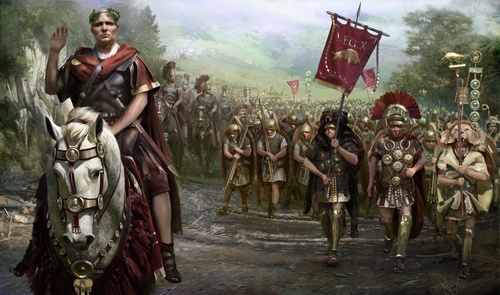Rate x Time = Distance problem?
 An army four miles long steadily advances four miles while a dispatch rider gallops steadily from the rear to the front, delivers a dispatch to the commanding general as he turns, and then gallops back to the rear.
An army four miles long steadily advances four miles while a dispatch rider gallops steadily from the rear to the front, delivers a dispatch to the commanding general as he turns, and then gallops back to the rear.
How far (in miles) has the dispatch rider traveled?
Assumptions:
All speeds remain constant
Time required for the rider to turn-about once he reaches the front = zero
Time taken for rider to complete both trips = Time taken for army to march 4 miles.
artwork from: Total War: Rome II | Total War (PC game)
The answer is 9.66.
This section requires Javascript.
You are seeing this because something didn't load right. We suggest you, (a) try
refreshing the page, (b) enabling javascript if it is disabled on your browser and,
finally, (c)
loading the
non-javascript version of this page
. We're sorry about the hassle.
Suppose the army has advanced x miles before the commanding general receives the dispatch. The dispatch rider will then have ridden x + 4 miles.
The dispatch rider now rides (x + 4) - 4 = x miles back to where the army commenced its advance. The rider will arrive at this point at the same time as the rear of the army does and when the front of the army completes its 4 miles advance. Thus, the rider travels 2x + 4 miles while the army travels 4 miles.
Assuming constant speeds throughout, the ratio of the dispatch rider's speed to the army's speed will also be constant. Thus:
(x + 4) / x = (2x + 4) / 4
=> 4x + 16 = 2x² + 4x
=> x = √8
This dispatch rider travels (2 · √8) + 4 miles = 9.66 miles.